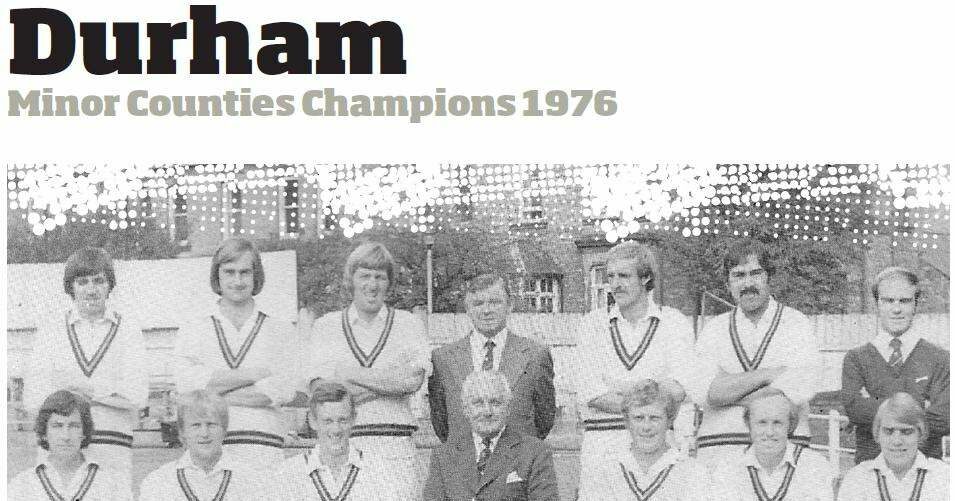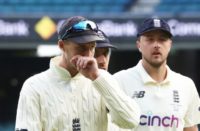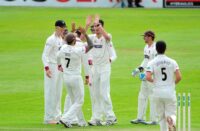By Neil Fissler
Neil Riddell admits Durham weren’t unhappy that it was the rain which enabled them to claim their first Minor Counties Championship in nearly half a century.
Durham had finished the season top of the table, but then had to face a challenge from second-placed Hertfordshire for the title.
The first two days at Ropery Lane, Chester-le-Street, were completely washed out by rain and it wasn’t until the final day that Hertfordshire won the toss and put the home side in.
In the 147 minutes’ play possible, Durham reached 100-4 before the game was called off and they were able to claim their first title since 1930 on the better record in qualifying.
Riddell explained: “The way it worked then was that there was one league and that you didn’t get to play every other county.
“At the end of the season, if the top team had beaten the second placed team they took the title but, if they hadn’t met, the second placed team would challenge the leaders.
“And the winner of that particular game would be the Minor Counties champions or, in the event of a draw, the team that had finished first would take the title. Hertfordshire challenged us to the game, and we weren’t particularly bothered about making a game of it.
“If we went in first we were going to bat for as long as we could, because all we had to do was avoid defeat.”
Durham, in 1976, started off a run of 65 games which would stretch to 1982 without them tasting defeat – something that is still a Minor Counties record.
That they would go on to claim four Minor Counties titles in nine years was, said Riddell, because the league system was so good in the local area and that the presence of good jobs meant they didn’t lose players.
“A few players, like Colin Milburn and Geoff Cook, went down the route of joining Northampton, but we were a strong Minor County,” he said.
“It was mainly because we tended to keep potential first-class cricketers in the North-East who didn’t want to move away because they had a good job. And also because these players wanted to play at the highest level they possibly could, which was Minor Counties, while also playing a decent standard of club cricket.
“A lot of them were club professionals and were very good players, and at the time we also had very strong Premier Leagues in Durham and North Yorkshire.
“When Brian Lander took over the captaincy it kind of took off from there. The team that beat Yorkshire in the Gillette Cup in 1973 took us into the mid-Seventies.
“We were a bit of a force to be reckoned with to be honest with you. Then the young players from 1976 took us right through into the Eighties.”
BACK ROW (left-right):
Tommy Harland: A wicket-keeper/batsman who lives in Hetton-le-Hole, Tyne and Wear, and worked in the coal-mining industry until retiring.
Johnny Johnston: A seamer who worked in a timber yard before his death in Stockton-on-Tees in June 2008, aged 55.
David Olaman: A batsman who was a postman, and who then worked in the family property company from his base in Hartlepool.
Jack Iley: Kept wicket for Durham before World War II, later serving the county as secretary and chairman. He sadly died in Torquay in June 1991 before they made their first-class bow the following year.
Stuart Wilkinson: The fast bowler lives in his native Ebchester, Co Durham, and has spent all of his working life in the civil service.
Richard Mercer: A wicket-keeper born in Stockholm, Sweden. Was Tynedale Council’s director of recreation before his death from lung cancer in Hexham, in October, 1996, aged 45.
Allan Reed: The Durham scorer was a school teacher and shared the scoring duties with Brian Hunt.
FRONT ROW:
David O’Sullivan: The New Zealand Test spinner has been cricket coach at Inglewood High School in his homeland.
Keith Turnbull: A batsman who became a solicitor and has been principal at law firm Marshall Hall Levy, in South Shields, since 2000.
Brian Lander: A seamer and captain. Spent 37 years working in IT at Durham University before retiring.
Arthur Austin: A metallurgist who was the chairman who played a tireless role in Durham gaining first-class status. He died in February, 2013, aged 97.
Neil Riddell: A batsman who spent ten years as Durham captain. Lives in Merrybent, near Darlington, and ran a family roofing business.
Frank Greenshields: Opening batsman spent his working life as a solicitor in Sunderland. A senior partner at McKenzie Bell.
Peter Birtwisle: A lower-order batsman who became an MCC coach as well as a dispensing optician with the family business, the Northern Optical Company, in Newcastle-upon-Tyne.
NOT PICTURED:
Colin Milburn: The England opening batsman earned a living making public appearances, working in radio and on the after-dinner speaking circuit before his death in February, 1990, aged 48.
Mohinder Amarnath: The Indian all-rounder has coached in India, Bangladesh and Morocco. He has also been a Test match selector.
Peter Crane: A batsman who worked in marketing and was later a business studies teacher for 28 years.
Robert Cook: A seamer. Lives in Burnopfield, Co Durham. Worked in local government for Gateshead Council.
Stuart Atkinson: Opening batsman also played for Netherlands in the 1986 ICC Trophy. A teacher who worked in Hong Kong for 24 years until retiring.
Tom O’Connor: The seamer worked for Dunlop and was the chairman of Gateshead Fell CC.
Bill Blenkiron: Fast bowler has run a sports shop in Bishop Auckland for more than 35 years. His son, Darren, also played for Durham.
John Stoker: A seamer who was a PE teacher and then deputy head of Spennymoor Comprehensive School. He died in Middridge, Co Durham, in October 2015.
Tim Haggie: Leg-spinner who qualified as a solicitor in 1971 and was a partner at Latimer Hinks Solicitors, in Darlington, for many years.
Alan Old: The brother of Chris was an England rugby union international and British Lions tourist. Was master at Worksop College, then principal of Cleveland Technical College.
This piece originally featured in The Cricket Paper, Friday July 1 2016
Subscribe to the digital edition of The Cricket Paper here















